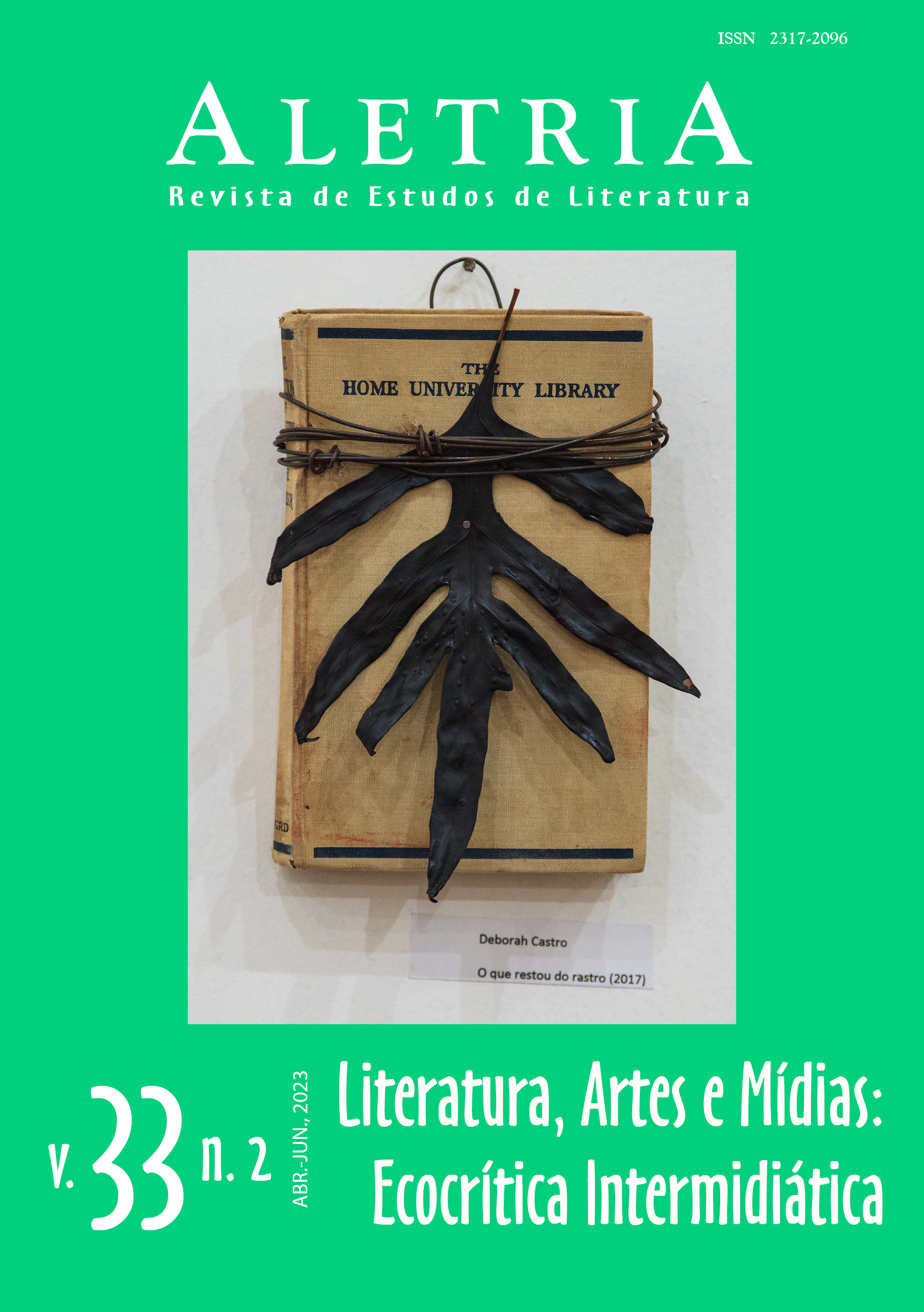Materialidade, Antropoceno, escala e futuro a partir de A Mulher das Dunas.
DOI:
https://doi.org/10.35699/2317-2096.2023.41018Palavras-chave:
Kobo Abe, Teshigahara, materialidade, tempo, adaptaçãoResumo
O artigo tenciona analisar o romance A mulher das dunas e a adaptação fílmica homônima em diálogo com algumas questões disparadas pelos debates do Antropoceno, especialmente as vertentes do denominado novo materialismo. A partir de situações insólitas, o filme e o livro enfatizam a íntima relação entre tempo, materialidade e escrita. Trata-se também da inserção das discussões sobre intermedialidade junto às produções literárias e audiovisuais com o intuito de tratar do tema dos novos materialismos associados às discussões acerca de ambas as obras, como a relação entre temporalidade e narrativa. Por fim, cabe considerar que esse ensaio também tenciona apresentar discussões que propiciem ir além da matriz teórica do ambientalismo.
Referências
ABE, Kobo. A mulher das dunas. Tradução: Fernando Garcia. São Paulo: Estação Liberdade, 2021.
ABE, Kobo. The Frontier Within: Essays by Kobo Abe. Edited, translated and with an introduction by Richard F. Calichman. New York: Columbia University Press, 2013.
ARMBRUSTER, Karla; WALLACE, Kathleen R. (ed.). Beyond Nature Writing: Expanding the Boundaries of Ecocriticism. Charlottesville: University Press of Virginia, 2001.
BAZIN, André. What is cinema? Berkeley: University of California Press, 2004.
BRUHN, Jorge. Towards an Intermedial Ecocriticism. In: ELLESTRÖM Lars (ed.). Beyond Media Borders. Cham: Palgrave Macmillan, 2021. v. 2, p. 117-148.
CHAKRABARTY, Dipesh. Anthropocene Time. History and Theory, Middletown, CT, v. 57, n. 1, p. 5-32, Mar. 2018.
COOLE, Diana; FROST, Samantha. New Materialisms: Ontology, Agency and Politics. Durham, NC: Duke University Press, 2010.
CRUTZEN, Paul; STOERMER, Eugene. O “Antropoceno”. Tradução: J. Mendes. Anthropocenica: Revista de Estudos do Antropoceno e Ecocrítica, Braga, v. 1, p. 71-89, 2020.
DERRIDA, Jacques. Mal de arquivo: uma impressão freudiana. Tradução: Claudia Rego. Rio de Janeiro: Relume Dumará, 2001.
GHOSH, Amitav. The Great Derangement: Climate Change and the Unthinkable. University of Chicago Press. 2016.
HARAWAY, Donna. Antropoceno, Capitaloceno, Plantationoceno, Chthuluceno: fazendo parentes. Tradução: Susana Dias, Mara Verônica e Ana Godoy. ClimaCom Cultura Científica – pesquisa, jornalismo e arte, Campinas, ano 3, n. 5, p. 139-146, abr. 2016.
HUTCHEON, Linda. Uma teoria da adaptação. Tradução: André Cechinel. Florianópolis: Ed. da UFSC, 2013.
LATOUR, Bruno. Diante de Gaia: oito conferências sobre a natureza no Antropoceno. Tradução: Maryalua Meyer. São Paulo: Ubu Editora, 2020.
MEILLASSOUX, Quentin. After Finitude: An Essay on the Necessity of Contingency. Tradução: Ray Brassier. London: Continuum, 2008.
SAVOYE, Daniel Ferrreras. Lo fantástico en la literatura y el cine: de Edgar Allan Poe a Freddie Krueger. Recife: Titivilus, 1995. Versão fac-similada.
STAM, Robert. A literatura através do cinema: realismo, magia e arte da adaptação. Tradução: Marie-Anne Kremer e Gláucia Renate Gonçalves. Belo Horizonte: Ed. UFMG, 2008.
WILLOQUET-MARICONDI, Paula. Shifting Paradigmas: From Environmentalist Films to Ecocinema. In: WILLOQUET-MARICONDI, Paula (ed.) Framing the World: Explorations in Ecocriticism and Film. Charlottesville: University of Virginia Press, 2010. p. 43-59.
WOMAN in the Dunes. Direção: Hiroshi Teshigahara. Roteiro: Abe-Teshigahara. Tokyo: Toho Corporation, 1964.
Downloads
Publicado
Edição
Seção
Licença
Copyright (c) 2022 Eduardo Ferraz Felippe (Autor)

Este trabalho está licenciado sob uma licença Creative Commons Attribution 4.0 International License.
Autores que publicam nesta revista concordam com os seguintes termos:Autores mantém os direitos autorais e concedem à revista o direito de primeira publicação, com o trabalho simultaneamente licenciado sob a Licença Creative Commons Attribution que permite o compartilhamento do trabalho com reconhecimento da autoria e publicação inicial nesta revista.Autores têm autorização para assumir contratos adicionais separadamente, para distribuição não-exclusiva da versão do trabalho publicada nesta revista (ex.: publicar em repositório institucional ou como capítulo de livro), com reconhecimento de autoria e publicação inicial nesta revista.Autores têm permissão e são estimulados a publicar e distribuir seu trabalho online (ex.: em repositórios institucionais ou na sua página pessoal) a qualquer ponto antes ou durante o processo editorial, já que isso pode gerar alterações produtivas, bem como aumentar o impacto e a citação do trabalho publicado (Veja The Effect of Open Access).





